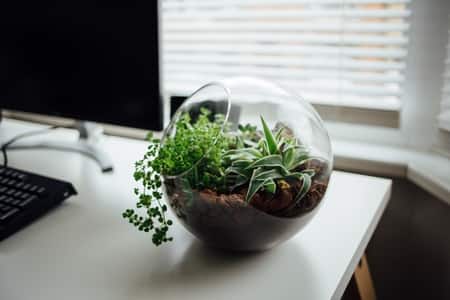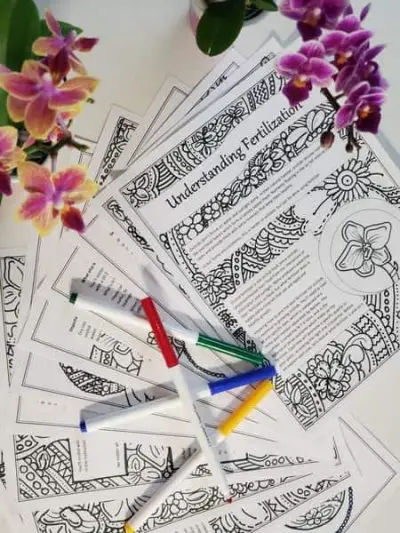7 Tips For Watering Your Orchid
While on Vacation
You have kept up your watering routine and your orchids show positive signs that they are adjusting well to the conditions of irrigation you are providing. Vacations tend to throw a wrench in the system, since you might be away for an extended period of time. Naturally, you’re concerned about how your orchids will survive.
How long can an orchid go without drying out?
Most orchids will survive for two to three weeks (a typical vacation period) without watering, occasionally up to one month. Cattleyas, Dendrobiums, and Phalaenopsis all will survive with up to three weeks of not watering as long as their medium is maintained moist. Few varieties can make it up to two months or longer, but with irrevocable damage before death.
Typical signs of dehydration are droopy wrinkled leaves, no root growth, and visible veins in the leaf. This question usually surfaces around vacation time. For a typical two-week vacation period, your orchid will be fine without watering.
If you are going on a longer vacation up to a month, there are some ideas and tips so the orchid won’t feel your absence as much.
Methods For Delaying How Long Your Orchid Will Dry Out
1. The first solution is to soak your orchid medium in water for thirty minutes the day you leave. This is an exaggerated amount of time, but the idea is to hydrate your orchid medium more than the typical watering cycle.
2. Another idea to avoid your orchid drying out is to add humidity. This can be done by adding water under the orchid planter.
Select a small pan filled with rocks, gravel, or other higher standing pebbles.
Fill the pan with water only half-way up to the sides of the gravel.
Do not cover the rocks with water.
Place the orchid pot over the pebbles.
Water will naturally evaporate over time, floating upwards towards the pot.
For longer periods of time, use a thicker layer of rocks and add more water.
3. After the pot is placed in the pan, place a clear plastic over the pot to retain the humidity. You have seen these clear bags over the flower spikes in floral departments or grocery stores. This maintains the humidity longer, not allowing it to escape into the dry environment of the supermarket. Flowers can be kept in these bags for months.

A good visual is the terrarium—a closed one. The terrarium does exactly this: it traps the humidity inside the glass and creates a mini-condensation cycle of its own. With the plastic bag securely tied over the pan trapping in the moisture, you are creating the terrarium-feel.If you are gone for a month or longer, try two things: take them outside and change the potting medium. Of course, both these options have variables that could lead to being a bad idea.
4.Take them outside if it is spring, summer or fall. Definitely don’t take them out in winter. Find a shady place under a tree, where direct sunlight won’t reach them but is light enough to benefit from being outside. If direct sunlight falls on the leaves for an extended period of time, the orchid will suffer and probably die. If you live in an area where rainfall is scarce, do not try this method either, unless you have a sprinkler system hooked up. Without it, being outside will only dry out your orchid more, leaving you with crunchy roots and wilted leaves when you return.
5. Change the potting medium: if the orchid is not in bloom, then this might be an option. Trade out harder materials that do not absorb water (as charcoal, fir bark, pebbles, gravel, Styrofoam peanuts, etc.) for sphagnum moss. Drench the sphagnum moss for thirty mutes before repotting, so it soaks up as much water as possible. Of course, this solution will only prolong the medium for a few days, but everything helps when looking at a month of not watering.
6. If all else fails, you can resort to checking with your local nursery. Some gardening stores will board your plant for a small fee and care for it. This might be a better solution if you’re planning on traveling for over a month, or for repeating periods of absence. Just because orchids will make it up to three weeks of no water doesn’t mean they like it or will thrive.
7. You can always get someone to water your orchids for you, but we hesitate to include this idea in our list because that suggestion has led to the death of many orchids. Loving and caring individuals who don’t know how to properly water your orchids will drench the little orchid-souls to their imminent drowning. In doubt, we’d prefer just to not include a house-sitter, or at least, give them a detailed lesson on how to water your orchids—and when NOT to water them.
After reading this article you might be tempted to over-water. So to answer our question, “Can orchids dry out?” the answer is “Yes!” They should.
According to Tim Johnson, from the Chicago Botanical Gardens, you should “Water your moth orchid early in the morning with rain or distilled water as the mix approaches dryness. It is best not to use water softened by a water softener. Watering once every four to seven days should suffice, and the plant should never stand in water. It’s healthy to have a small dry spell so the roots don’t create fungus.” Source: Chicago Tribune Newspaper
Over-watering is an extreme danger and probably one that kills more orchids than letting them dry out. Make sure you know how to test the potting medium.
If you need more tips, this article about watering orchids published in Redlands Daily Facts by Joyce Dean, a member of the Riverside-San Bernardino Counties Orchid Society, has some pointers.
published in Redlands Daily Facts by Joyce Dean, a member of the Riverside-San Bernardino Counties Orchid Society, has some pointers.
There is one situation where you would actually gain from not watering an orchid: extreme root rot. Remove all the moss and other potting medium, and let the orchid sit in its pot without anything.
Nothing. Nada. Zilch. Zero potting mix.
The orchid will suffer, but it’s an extreme measure to save an orchid with in an extreme humidity crisis. The orchid can survive up to almost two months, depending on the species, then transfer it back into a moist potting mix covered in sphagnum moss. We personally can’t think of any other reason to not water an orchid.
Now that you know all about watering while on vacation, and keeping your soul thirsty for God, may your trip be fantastic! And better yet, may you return home to find your orchids thriving and well.
Before you leave, check out some of our other articles about humidity, using sphagnum moss as potting medium, or what to do after the flowers fall off.
If this information was of any help, and clarified any doubts you had, please mention so in the comments. I love to interact with other orchid enthusiasts, and we can share from our experiences.
Share this page with a friend who has an orchid, comment, or just give me a thumb’s up 😊 in the comments below.
Don’t Stop Learning!
If you want to be included in more information and get a 14-page fertilization guide, please sign up for my newsletter. I don’t spam, but send emails out bi-monthly with some curious topics of interest. If you want more information, click here to go to a specific page on this website where I explain it more in detail.

Also, if you are looking for an orchid journal to keep your notes specifically about orchid care, check out my 2 solutions for that on this page. If note-keeping isn’t your thing, then there is a free excel spreadsheet that you can download. Click here for more information on how to do that.
If you subscribe to my newsletter, I will send you a 14-page guide on the main tips of orchid fertilizer. It is downloadable and you can print it out on your computer. I designed the guide to double up as a coloring book, just to make it fun.
Happy cultivating!

